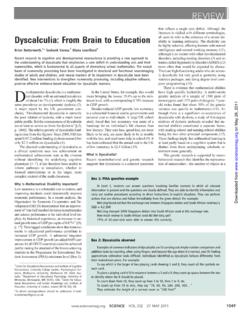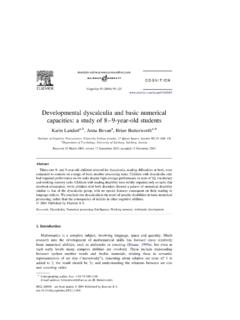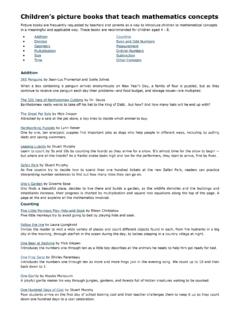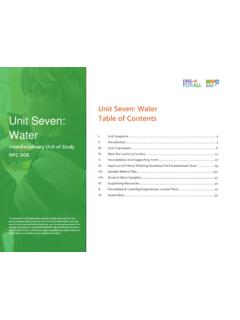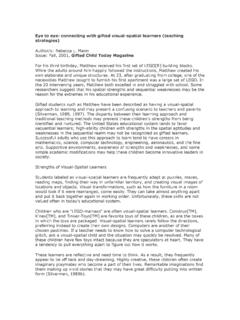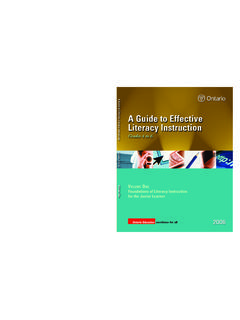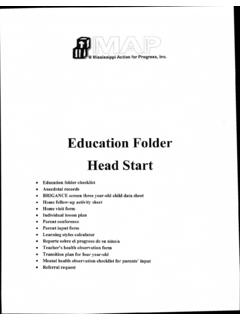Transcription of Mathematics and the Brain
1 And the BrainOpening Address to The Mathematical Association,Reading: April 3rd 2002 Brian ButterworthThank you for inviting me. I am honoured to be addressing must start with some confessions. I am not a mathematician. Ihave never taught Mathematics , except domestically. And, I amnot going to treat the whole of Mathematics in this address, butjust one very basic element is said to be good mental exercise to believe three impossiblethings before breakfast. It is now after lunch whether thismakes such a task easier or harder, I don t know, but I will beasking you to entertain three difficult, but not impossible, , that we are born with circuits in the Brain that arespecialised for number in particular, for cardinal number thenumber of objects in a set, the concept that underlies next two propositions follow from this , if the genes can be programmed to build thesespecialised Brain circuits, then now and again there will be agenetic anomaly and the Brain does not grow the right who suffer this condition are sometimes calleddyscalculics.
2 The main presenting symptom is that they havegreat difficulty understanding numbers. Being born withdyscalculia is a bit like being born colour-blind (also caused by agenetic anomaly) except here it is a kind of necessary neural system has just failed to develop is no cure, but there may be ways of working around theproblem and also ways of making it worse (as I will explain).Third, if we are born with specialised number circuits, then wehave evolved to understand at least some aspects of number and the Brain : Brian Butterworthdo not require the benefit of formal education. We may indeedhave evolved to learn about the basic aspects of number in a waythat is comparable to the way we learn a language. Formalinstruction is not necessary, but exposure to a language is.
3 StevenPinker has argued that we have a language instinct that enablesus to pick up our first language (or languages) quickly and easilyin a language-rich setting. Perhaps the same is true forarithmetic. I will argue that early Mathematics education fails torecognise our innate mathematical capacities, and, as a result,has turned millions of children away from Mathematics . It isbetter, I will suggest, not to teach formal arithmetic at all atleast not in the primary school years. Let children pick it up, asthey need it, as they are interested, just as they learn their me start with the first difficult proposition: that we are bornwith circuits in the Brain that are specialised for number inparticular, for cardinal number.
4 What is more, this system is thebasis of subsequent Mathematics learning at least, subsequentarithmetic is just language Surely, you will respond, There is nothing special in our brainfor maths. You may counter with one of these plausiblealternatives. Mathematics is a language, even the simplemathematics of numbers. Numbers are, after all, also words, one, two, three . We are taught Mathematics throughlanguage. Think of our multiplication tables. Didn t we have torecite them like poetry or perhaps like the nonsense verse,Jabberwocky until we knew them by heart as verbal formulae?What is more didn t the mathematician, Keith Devlin, in hisbook The Maths Gene, demonstrate that the maths gene was infact the number gene?
5 At a more sophisticated level, didn t the linguist, NoamChomsky, argue that the essential feature of number wasrecursion building larger and larger numbers recursively, evendefining operations on numbers (such as addition), recursively?And that recursion is part of syntactic apparatus of language. So,if we have language, as a consequence of our language genes, weget recursion for and the Brain : Brian ButterworthCounter arguments to languageOne way to look at this is to ask whether people withoutlanguage can manage to do Mathematics . This where brainscience provides critical evidence. One of our patients, who Ishall call, Mr Harvey, a 64 year old former banker, wassuffering from dementing illness that was slowly eating away atthe language centres of his Brain .
6 When we started testing hiscalculating abilities, he could understand very little of what wassaid to him. He was unable to do one of the simplest tests ofunderstanding pointing to a named picture. He was also quiteunable to name the commonest objects in a standard picturenaming test. However, his arithmetic was near and the Brain : Brian Butterworth64 yr old, RH retired banker. Relatively preservedautobiographical memory; reduced vocabulary, manystereotyped phrases - I delved into that .. L. temporalatrophy increasing, some hippocampal and R temporal of semantic dementia .Butterworth, B., Cappelletti, M., & Kopelman, M. (2001)Nature Neuroscience, 4, 784-786 and Cappelletti, M.
7 ,Butterworth, B., & Kopelman, M. (2001) Neuropsychologia, 39, and the Brain : Brian ButterworthGraded Difficulty Naming Test0/30 Naming line-drawingsVegetables0/7 Body parts 2/8 Animals0/9 Musical instruments0/5 Furniture1/5 Means of transport1/6 Signs of the Zodiac0/12 Naming real objects0/15 Fluency (all categories)0 Word-picture matchingchanceTasks%Single Digit Arithmetic+97-100x97 Multidigit ArithmeticJackson & Warrington Test96+ Numbers on line100 TranscodingFrom Numerals100To and the Brain : Brian ButterworthSo, language skills are not necessary for , it is possible that language is necessary for learningto calculate, but the ladder can be thrown away once you reachthe landing of skilled performance. This is plausible, but there isone counter-example: A severely autistic young man, studied byHermelin and O Connor a few years ago.
8 He was unable tospeak, to understand speech, and he could communicate in onlythe most rudimentary way with gestures. He was nonethelessable to find factors and primes in numbers faster and moreaccurately than a university-trained mathematician (and nowFRS). We don t know how he striking, perhaps, is that infants, even in the first weeks oflife long before they are able to understand speech or speakthemselves, have simple numerical abilities. They notice, forexample, when the number of objects in a display changes. Theywill look longer at a new display with more or fewer objects,than one with the same number. What s more infants can addand subtract: if you show them one doll going behind a screenand then a second doll going behind the screen, they will expectthere to be two dolls when the screen is removed.
9 We know thisbecause they look longer when there is one doll or three dolls they look longer at the unexpected. Similarly, if they see twodolls go behind the screen and then one is removed, they willexpect there to be one are simple things that can be done without language. Wedo not, at present, understand the relationship between theseinfantile capacities and later arithmetic skill. My own guess, andthis is only a guess, is that such capacities form the basis of laterskill. Being able to recognise small numerosities may supportlearning to count it s a way of checking the accuracy of , we do not know yet which part of the Brain the babiesare using for these tasks. We now know which parts of the brainadults use, and for this innate system to serve as the basis forlater developments it should be the only is language not necessary for simple numerical tasks, itis also not sufficient.
10 Again we can draw on evidence frompatients. A patient I shall call Signora Gaddi kept the books ofthe family hotel in NE Italy before she suffered a stroke. Thisleft her language entirely intact, but her numerical skillsprofoundly compromised. For example, she was unable to countabove four. If you present five objects for her to count, and the Brain : Brian Butterworthwould say. uno, due, tre, Quattro, la mia matematica finiscequi. ( My Mathematics finishes here. ) We tried her on allkinds of tasks adding, subtracting, and so on but shecouldn t get above four on any of them. Even asking her to saywhether 5 or 10 were larger. She had lost her numbers abovefour completely she could not even say the number of days inthe week, her age, shoe size or address.
